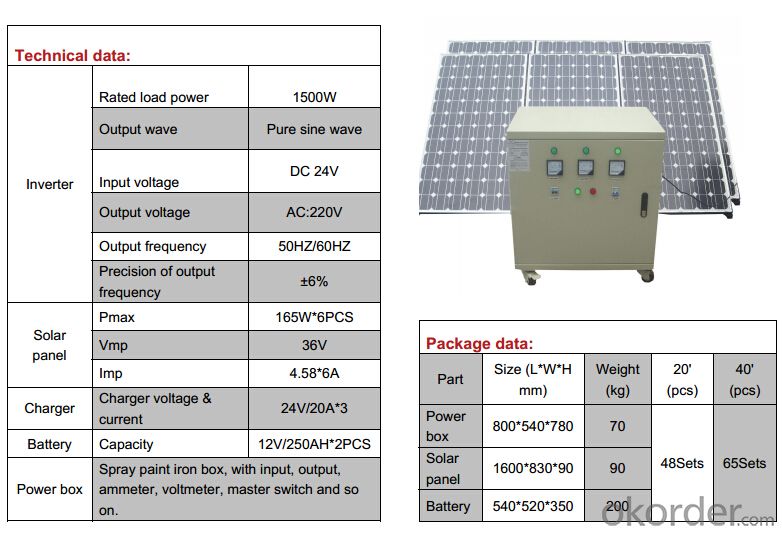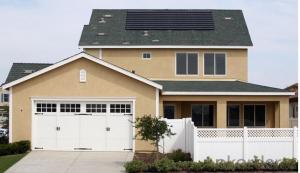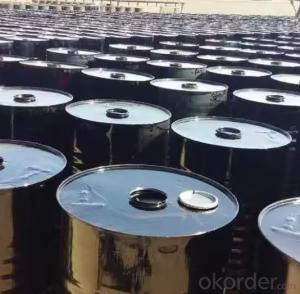solar system 1kw which made in China
- Loading Port:
- China Main Port
- Payment Terms:
- TT OR LC
- Min Order Qty:
- -
- Supply Capability:
- -
OKorder Service Pledge
Quality Product, Order Online Tracking, Timely Delivery
OKorder Financial Service
Credit Rating, Credit Services, Credit Purchasing
You Might Also Like

- Q:Can a solar energy system be used in areas with high winds?
- Yes, a solar energy system can be used in areas with high winds. While high winds can potentially cause damage to the system if not properly installed, modern solar panels are designed to withstand various weather conditions, including high winds. Most solar panels are tested and certified to withstand wind speeds of up to 140 miles per hour (225 kilometers per hour). Additionally, solar panels can be securely mounted on rooftops or using ground mount systems that are specifically designed to withstand strong winds. It is important to ensure that the solar energy system is installed by professionals who understand the local wind patterns and can appropriately design and install the system to withstand high winds.
- Q:How do solar energy systems affect the installation of satellite dishes?
- Solar energy systems can potentially affect the installation of satellite dishes by obstructing the line of sight between the dish and the satellite. It is important to carefully plan and position both the solar panels and satellite dish to ensure they do not interfere with each other.
- Q:Can solar energy systems be used in areas with high altitude?
- Yes, solar energy systems can be used in areas with high altitude. In fact, solar panels can often be more efficient in high-altitude regions due to thinner air allowing for more direct sunlight and less atmospheric interference. However, it is important to consider factors like temperature, snowfall, and maintenance challenges that may arise in such areas.
- Q:Can solar energy systems be used in areas with frequent cloud cover?
- Yes, solar energy systems can still be used in areas with frequent cloud cover. While cloud cover can reduce the amount of sunlight reaching the solar panels, modern solar energy systems are designed to efficiently harness even indirect sunlight. Additionally, advancements in technology, such as the use of tracking systems and more efficient panels, have made it possible to generate electricity from solar energy even in areas with less consistent sunlight.
- Q:How does the efficiency of solar panels vary based on the cleanliness?
- The cleanliness of solar panels can impact their efficiency. When solar panels are free from dirt, dust, or debris, they are able to capture more sunlight and convert it into electricity more effectively. Clean solar panels are less likely to be obstructed by dust particles, which can limit their ability to absorb sunlight. Furthermore, a buildup of dirt or grime on the surface of solar panels can create a barrier that blocks sunlight from reaching the photovoltaic cells, thus reducing their efficiency. To ensure optimal performance, it is crucial to regularly clean and maintain solar panels. By keeping them clean, their efficiency can be maximized, resulting in improved electricity generation. It is advisable to periodically clean solar panels, especially in areas with high levels of dust or pollution, or during seasons when there is an increased presence of pollen or debris in the air. By doing so, the solar panels can continue to operate at their highest efficiency, leading to increased energy production and overall system performance.
- Q:Can solar energy systems be used in areas with limited access to sanitation facilities?
- Yes, solar energy systems can be used in areas with limited access to sanitation facilities. Solar energy systems can provide electricity to power sanitation facilities such as water pumps, filtration systems, and waste treatment processes, helping to improve sanitation conditions in these areas. Additionally, solar-powered systems can also be used to generate heat for water heating, further supporting sanitation practices.
- Q:Can solar energy systems be used in areas with high levels of air pollution from industrial activities?
- Yes, solar energy systems can still be used in areas with high levels of air pollution from industrial activities. While air pollution may affect the efficiency of solar panels to some extent, they can still generate electricity and contribute to reducing the overall carbon footprint. Additionally, using solar energy can help to diversify the energy mix and reduce reliance on polluting sources.
- Q:Can solar energy systems be integrated with other energy sources?
- Integrating solar energy systems with other energy sources is a widely adopted approach in various applications to guarantee a dependable and steady provision of electricity. Given that solar energy is intermittent and reliant on sunlight availability, combining solar energy systems with alternative sources, such as batteries or the power grid, facilitates the storage of surplus energy generated during sunny periods and enables the provision of electricity during sunlight scarcity. A prevalent method of integration involves the use of hybrid systems, where solar panels are amalgamated with other renewable energy sources like wind or hydroelectric power. This integration allows for a more consistent and reliable energy supply since the different sources can compensate for fluctuations in one another. Moreover, solar energy systems can be integrated with traditional energy sources like natural gas or coal-based power plants. This integration contributes to the reduction of carbon emissions and aids in the shift towards a cleaner and more sustainable energy mix. By combining solar energy with other sources, the overall energy generation capacity is augmented, resulting in a more stable and secure energy supply. In conclusion, integrating solar energy systems with other energy sources is a pragmatic and efficient approach to maximize the advantages of renewable energy while ensuring a continuous and dependable electricity supply.
- Q:What is the impact of lightning on the performance of solar panels?
- The impact of lightning on the performance of solar panels can vary depending on the specific circumstances. In some cases, lightning strikes can cause direct damage to the panels themselves, leading to reduced or even complete loss of functionality. Indirect effects, such as power surges or electromagnetic interference, can also disrupt the operation of solar panels and related equipment. However, with proper installation and protective measures in place, the risk and impact of lightning strikes can be minimized to ensure the optimal performance and longevity of solar panels.
- Q:How do solar batteries store excess energy?
- Solar batteries store excess energy by converting the surplus electricity generated by the solar panels into chemical energy. This chemical energy is stored in the battery in the form of charged ions, which can be released as electrical energy when needed, such as during periods of low sunlight or high energy demand.
1. Manufacturer Overview |
|
|---|---|
| Location | |
| Year Established | |
| Annual Output Value | |
| Main Markets | |
| Company Certifications | |
2. Manufacturer Certificates |
|
|---|---|
| a) Certification Name | |
| Range | |
| Reference | |
| Validity Period | |
3. Manufacturer Capability |
|
|---|---|
| a)Trade Capacity | |
| Nearest Port | |
| Export Percentage | |
| No.of Employees in Trade Department | |
| Language Spoken: | |
| b)Factory Information | |
| Factory Size: | |
| No. of Production Lines | |
| Contract Manufacturing | |
| Product Price Range | |
Send your message to us
solar system 1kw which made in China
- Loading Port:
- China Main Port
- Payment Terms:
- TT OR LC
- Min Order Qty:
- -
- Supply Capability:
- -
OKorder Service Pledge
Quality Product, Order Online Tracking, Timely Delivery
OKorder Financial Service
Credit Rating, Credit Services, Credit Purchasing
Similar products
New products
Hot products
Hot Searches
Related keywords




























